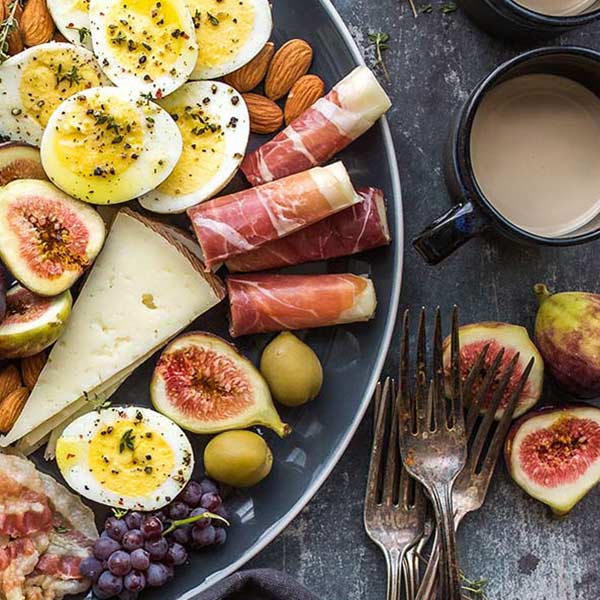Subtotal: $
Checkout-

The Birthday Party at the End of the World
-

From Farm to Feast
-

Readers Respond: Issue 20
-

Family and Friends: Issue 20
-

Streams in the Desert
-

The Boy and the Bull
-

This Is My Body
-

The Greatest Thing Since Sliced Bread
-

The Ground of Hospitality
-

Beating the Big Dry
-

Cows and Elephants
-

At the Welcome Table I
-

At the Welcome Table II
-

Love Is Work
-

How Shall We Farm?
-

Why Yemen Starves
-

Digging Deeper: Issue 20
-

Cloth and Cup
-

Level
-

Editors’ Picks Issue 20
-

The Necessity of Reverence
-

A Book to End All Walls
-

Edna Lewis
-

The Dead Breed Beauty
-

Table Fellowship
-

Covering the Cover: The Welcome Table
-

Restoring a Creek
-

What I Stand For Is What I Stand On

We take off our shoes at the door. Greetings are exchanged, women with women and men with men: three kisses, one on one cheek, then the other, then back to the first. Choni! Bxer bin! Bashim Supas! How are you? Welcome! I’m fine, thank you!
We are ushered into the kitchen, where the warmth and smell of spices are a stark contrast to the cold of the outside air. A long plastic tablecloth is on the ground, covered in food. There are huge platters of biryani rice with nuts and raisins sprinkled around the sides; large pots of various stews – a brilliant orange apricot, green and red okra, a purple-brown eggplant, all thick and steaming; chicken and beef in pans; small glass bowls of chopped cucumber, onion, apple, and tomato; green olives; containers of thick pomegranate syrup; and large plates of parsley, lemon, and onions for garnish. And then there is the bread – huge, round, flat bread, not on plates, but placed all over the plastic so that it is within easy reach of all of us.
We gasp at the sheer volume of goodness. Our hosts laugh at our expressions and my feeble attempts at Kurdish as I say, “You are an artist with food!” to our hostess.
We sit on the floor and without further ceremony everyone fills their plates and eating begins. Our gasps change to murmurs of delight. We eat, and eat, and eat. Every time we begin to slow down, more food is put on our plates. Conversation is minimal, until suddenly our host looks at us and says in Kurdish, “Do you like Kurdistan?”
Kurdish Hospitality
We moved to Kurdistan in early September, when the heat of the summer had burned up any trace of green and the earth was brown and dry. We left family, friends, and established jobs for a place that we only knew from visits. The most common responses: “Why?” “Will you be safe?” And – my personal favorite – “You’re batshit crazy!” We had first visited Kurdistan in 2015, invited to participate in a humanitarian aid trip. At that time the area was reeling from two crises: ISIS (or D’aesh) had moved into the second largest city in Iraq and was busy displacing people and destroying lives, and an economic crisis had shuttered thriving businesses and plunged many into financial desperation.
Here, food is an invitation into life. Despite all this, Kurdistan captured my heart. Maybe it was the hopeful faces when all the surrounding circumstances gave no indication of changing. Maybe it was the resilience that I heard about in every story. I don’t know, but the pull on my heart was strong. Three years later both my husband and I were offered jobs at a public university, and it seemed that the only response possible would be to go. The honor of walking beside a group of people who had gone to hell and back several times – and who responded with the resilience of laughter, hope, and good food – was too compelling. We emptied our house and our retirement accounts and entered life in Kurdistan.
We quickly learned that food here is not just about food. It is an invitation into life. Each dish takes hours to prepare and is served with care and creativity. As you eat you find out that a mother brought this recipe with her when she moved from neighboring Iran, or that a grandmother served this to her family every week after Friday prayers. Stories are baked into the dishes, each one a mess of memories and family lore.
When you are invited for a meal, time no longer dictates your schedule. You are usually at the person’s home for no less than five or six hours. On arrival you are served water. This is followed by the main meal. After the main meal, you sit back and talk. Sometimes people doze, heavy with sleep that comes after a delicious meal. After about an hour, sweet, amber-colored tea is served in small glasses on equally small china saucers. After tea you sit back and talk some more, in our case often sharing laughter over missed communication and Kurdish mistakes. Then, you are served more tea and often a wrapped candy. But the meal is not yet over. It is not over until you are served fruit – fresh fruit according to the season. In summer, it is bright red watermelon, apricots, plums, and peaches. In the fall it is fresh figs, melons, and pomegranates, their bright red seeds pungent with flavor. In the winter it is apples, oranges, and bananas, while the spring brings strawberries and grapes. Serving fruit is a signal that it’s almost time to leave, and departure itself is a process. Often we are invited to spend the night. “And then we will eat breakfast together!” says the host excitedly. We have not yet had that adventure.
The Nourishing Food of Scripture
Eating meals in Kurdistan has made me think about food in scripture. From Old Testament prophets eating scrolls that tasted as sweet as honey to multiplying loaves, food is central to scriptural themes, present in the miracle and in the metaphor.
In the New Testament, we are taken to the hills around Lake Galilee where we participate in a story of people so hungry for the Word that they forget their physical hunger. We see the disciples wanting to tell them to go to their own homes, to eat and then come back. Instead, we see this man Jesus take simple food of bread and fish and make it for everyone, with some left over. Some of us have heard the story so many times that we forget to smell the bread and taste the fish. We forget the wonder of nourishment.
We see food again after the resurrection. On the banks of the Sea of Galilee Jesus is watching the disciples fish in a boat. They have fished the entire night and they’ve caught nothing. Their nets and stomachs are empty. He tells them to try one more time, and they are not disappointed. They catch so many fish that their nets begin to break. And then Jesus says words that are an invitation to so much more than food, “Come have breakfast.” He invites not only the disciples, but us, to breakfast, to take in the wonder of good food, served hot and fresh by the side of the sea. It is the wonder of breaking a fast after a long night of labor, the food an invitation into nourishment and rest.
We see it in the metaphor. We taste of the Lord’s goodness and we begin to understand Jesus as the bread of life. We eat the bread of heaven and are told that this nourishment will last through eternity. We eat, we drink, we taste, we see.
With our penchant for the instant and our focus on the easy, Western culture is forgetful. But Western culture is forgetful. With our penchant for the instant and our focus on the easy, we have come far from the culture where those words were written. Large supermarkets and an abundance of prepared foods have erased both the process of cooking and our personal connection with our food. Busy schedules have led to rushed meals, more of a hassle than an invitation to rest and nourishment. We are obsessed with diets and weight loss, gluten and other food allergies, but we’ve forgotten to think about meals as a way to reconnect with family, a time to welcome friends and strangers, a way to share our lives.
As I look at the food metaphors woven throughout the Old and New Testaments, I remember that they were written in a culture similar to Kurdish culture – a culture where bread is precious and, much like the holy bread of communion in many faith traditions, you never throw it away. A culture where food is so much more than food groups and nutrition. It is friendship, nourishment, and hospitality: these things sustain us longer and more deeply than mere calories.
In Remembrance of Me
It is thanks to Kurdish hospitality that I have come to see the Last Supper with new eyes. Of the many ways that Jesus could have communicated with his disciples at this pivotal time, he chose a feast. At this feast, I picture them reclined, not around a table, but on a floor covered with dishes of all kinds: the stews, the meats, the olives, the sauces, the salads – all of it served with extravagant hospitality. It was over a meal that Jesus held up the everyday elements of bread and wine and presented them to those frail humans: gifts that would be remembered in every Christian faith tradition until the day of his return. He changed the common into the extravagant, he elevated the mundane into the sacred.
During those three years together they had walked many miles and eaten countless meals that they probably didn’t remember. But there in that room, they shared a meal to remember. A meal that is made into a sacrament. “As long as you eat this bread and drink this cup…” Do this and be nourished, then go out and nourish others. Do this and remember me. Remember me in the texture and the flavor. Remember me with a meal.

Already a subscriber? Sign in
Try 3 months of unlimited access. Start your FREE TRIAL today. Cancel anytime.







































Coco
Great read. Your stock photo has prosciutto on it tho.
Becki Hawkins
Oh sounds so delightful!!! Beautifully written! I envisioned every bit!!